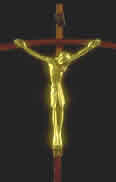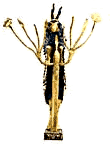| |||||||||||||||||||||||||||||||||
| Guesses > The End > Sailboat in the Basement |
| |
Sailboat
|
| |
|
|
Using critical scholarship to prove the Christ myth is true is like building a sailboat in the basement—oops, we've got trouble with the basic concept. |
That's worth keeping in mind, because when it comes to Christianity's Pagan origins, lots of modern "scholarship" is really modern apologetics, aimed to show the Christ myth fitting with logical, rational, scientific reasoning. The trouble is... Magic and miracle are never reasonable. You'd think this would be obvious, but it's not. I'm gonna 'splain it with an example, because I don't want you to think I'm making this up: |
The elephant in the faculty lounge |
of the critical scholarship of Christian origins is, "Is Christianity true?" But critical scholarship—rational scholarship—can't honestly answer the question, because critical scholarship is a ruler that isn't marked to measure what we really want to know. |
| The famous believing scholar, Doctor of Divinity Arthur Darby Nock, wrote this much quoted paragraph about Jesus (which you might as well skip, since it's translated in the next green box). >> |
|
But that's silly. At least it's silly if we're talking about rational, scientific thinking. A magical miracle is never more likely than something that is actually physically possible. |
|||||||||||||
|
If you know a rule that can tell when a miracle is ever more likely than something that is actually physically possible, we'd all like to hear it. There isn't one. And that's the point. Using critical scholarship to prove the the Christ myth is true is like building a sailboat in the basement—oops, we've got trouble with the basic concept. So what? So nothing. Doctor of Divinity Arthur Darby Nock is still widely admired for his "acuity," and his paragraph is still reprinted and nodded over throughout scholarly Christendom. In fact this is exactly the sort of stuff believing scholars write down and pass around. |
|
|
But now you know better. |
Yeah, yeah Poindexter. Is it possible Jesus' resurrection was real? —Well, yes. But only if magical, miraculous, supernatural things are possible. And, when you think about it, that's exactly the point of the miracle of Jesus' resurrection. The miracle points up God's power, proves there really is something supernatural going on. But that's not critical scholarship. That's theology. |
Fool's errand This maybe isn't obvious to you, at least it wasn't obvious to me when I started reading about the Pagan Christs, but rationalism and theology answer different questions. Rationalism is about empiric fact. Rationalism denies the possibility of the supernatural. The recurring modern question about Christianity is, "Is it true?" Was Jesus God's son? Did He do miracles? Did He rise on the third day for the salvation of mankind? The point of the story is that the story is supernatural. But miracles aren't rational. Resurrection isn't rational. Critical scholarship—rational scholarship—can't do supernatural. Pity the scholars who poke around for the comet that wasn't there to explain the star that heralded Jesus' birth—they're missing the point. The point of the star is that the star and the birth were supernatural. Scholarizing out the supernatural is as demeaning to the story as dismissing it lock stock and improbability as myth. Miracles? Was the thing that Jesus did supernatural or not? There isn't a rational test to tell. Ditto Paul's conversion. Ditto resurrection. Ditto Pentecost. Ditto, ditto, ditto. The more I read other people stumbling around Christianity's Pagan origins,
the more I realize we're all on a fool's errand. The elephant
in the faculty lounge of the critical scholarship of Christian
origins is, "Is Christianity true?" But critical
scholarship—rational scholarship—can't honestly answer the
question, because critical scholarship is a ruler that isn't marked
to measure what we really want to know. |
||||||||||

|
A scholarly and handsome
reader Kicks POCM's Ass |
||||||
| |||||||
| top |


 "In
Christianity everything is made to turn on a dated experience
of a historical Person; it can be seen from I Cor
15:3 that the statement of the story early assumed the
form of a statement in a Creed. There is nothing in
the parallel cases which points to any attempt to give
such a basis of historical evidence to belief"
"In
Christianity everything is made to turn on a dated experience
of a historical Person; it can be seen from I Cor
15:3 that the statement of the story early assumed the
form of a statement in a Creed. There is nothing in
the parallel cases which points to any attempt to give
such a basis of historical evidence to belief"

 myths
like the dying and rising god developed over hundreds of years
myths
like the dying and rising god developed over hundreds of years
 Is
it possible Jesus resurrection was real?
Is
it possible Jesus resurrection was real?
 Edwin K. P. Chong, Ph.D.
Edwin K. P. Chong, Ph.D.  It
is possible to believe in miracles. But it is not possible
then to claim the dignity and credibility of civilized rational
thought. Miracles are a fundamentally stone age, pre-rational,
idea. Have "faith in miracles," and you're
standing on the side of the room with Zeus, and Baal, and the
naked Pagan cannibals.
It
is possible to believe in miracles. But it is not possible
then to claim the dignity and credibility of civilized rational
thought. Miracles are a fundamentally stone age, pre-rational,
idea. Have "faith in miracles," and you're
standing on the side of the room with Zeus, and Baal, and the
naked Pagan cannibals.